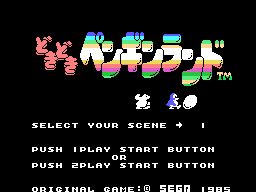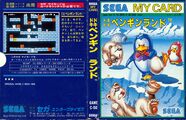Difference between revisions of "Doki Doki Penguin Land"
From Sega Retro
| Line 91: | Line 91: | ||
==History== | ==History== | ||
===Development=== | ===Development=== | ||
| − | ''Doki Doki Penguin Land'' was the first game to be designed by future president of Sega, [[Hisao Oguchi]]. The decision to use penguins stemmed from a series of popular television advertisements for Suntory Can Beer beginning in 1983, which used animated penguins (later known collectively as ''Penguin Family'', and then ''Papipu Penguins''). These penguins would prove popular enough to inspire a penguin craze in Japan, and alongside a range of merchandise, a feature-length animated film, ''Penguins Memory: Koufuku Monogatari'' would be released in 1985. | + | ''Doki Doki Penguin Land'' was the first game to be designed by future president of Sega, [[Hisao Oguchi]]. The decision to use penguins stemmed from a series of popular television advertisements for Suntory Can Beer beginning in 1983, which used animated penguins{{ref|https://web.archive.org/web/20220620124733/https://sega.jp/fb/album/02_dp/03.html}} (later known collectively as ''Penguin Family'', and then ''Papipu Penguins''). These penguins would prove popular enough to inspire a penguin craze in Japan, and alongside a range of merchandise, a feature-length animated film, ''Penguins Memory: Koufuku Monogatari'' would be released in 1985. |
The game's name was inspired by the Japanese television show ''Waku Waku Doubutsu Land''{{ref|https://web.archive.org/web/20220620124733/https://sega.jp/fb/album/02_dp/03.html}}. | The game's name was inspired by the Japanese television show ''Waku Waku Doubutsu Land''{{ref|https://web.archive.org/web/20220620124733/https://sega.jp/fb/album/02_dp/03.html}}. | ||
Revision as of 17:01, 19 November 2022
| Doki Doki Penguin Land | ||||||||||||||||||||||||
|---|---|---|---|---|---|---|---|---|---|---|---|---|---|---|---|---|---|---|---|---|---|---|---|---|
| System(s): Sega SG-1000, Arcade, MSX | ||||||||||||||||||||||||
| Publisher: Sega Pony | ||||||||||||||||||||||||
| Developer: Sega R&D 2 | ||||||||||||||||||||||||
| Licensor: Sega | ||||||||||||||||||||||||
| Genre: Puzzle[1] | ||||||||||||||||||||||||
| Number of players: 1-2 (alternating) | ||||||||||||||||||||||||
|
This short article is in need of work. You can help Sega Retro by adding to it.
Doki Doki Penguin Land (どきどきペンギンランド) is a Sega SG-1000 puzzle game developed by Sega R&D 2 and published by Sega. First released in Japan in 1985, it was additionally brought to Taiwan, and saw a port to Japanese arcades and MSX personal computers.
A Sega Master System sequel, Doki Doki Penguin Land: Uchuu Daibouken, was later released in August 1987, where it was localized as Penguin Land.
Contents
Gameplay
The basic aim of Doki Doki Penguin Land is to guide an egg from the top of the screen to the bottom. To do so means digging downwards, making sure it does not smash in the process. As a puzzle-platformer, everything is affected by gravity, and if the egg falls from a great height, it will smash. Success is achieved by making your way down the playfield carefully.
You control a Adelie (アデリー) the penguin, guiding the egg to his girlfriend, Fairy (フェアリー). ![]() jumps,
jumps, ![]() digs. Adelie can push the egg left or right, and can jump on it to make sure it doesn't get stuck against a wall. Digging affects the tile one block left (or right) and one block down away from the penguin's position, meaning it is impossible to dig straight downwards. If the egg gets into a position where it cannot be moved left or right, jumping and landing on it will cause it to smash.
digs. Adelie can push the egg left or right, and can jump on it to make sure it doesn't get stuck against a wall. Digging affects the tile one block left (or right) and one block down away from the penguin's position, meaning it is impossible to dig straight downwards. If the egg gets into a position where it cannot be moved left or right, jumping and landing on it will cause it to smash.
Adelie cannot be damaged, but can be temporarily stunned, the objective being to protect the egg, not necessarily yourself. If the player leaves the screen from the bottom he/she will emerge from the top.
Common objects are as follows:
| Normal block | |
|---|---|
| Normal blocks hinder progress but can be smashed without any problems. Once gone, they never return. | |
| Solid block | |
| Solid blocks cannot be moved or altered in any way. | |
| Yellow block | |
| These yellow blocks will allow the egg to fall through, but not the penguin. | |
| Rock | |
| Rocks can be pushed around horizontally, but will fall if there is space below. They are the best tool for defeating enemies, but as they cannot be destroyed, can also double up as an obstacle. They can also be hit from above or below to help them fall. | |
| Heart | |
| Hearts merely add points. Some can be found within blocks. | |
| Gengou (ゲンゴウ) | |
| These polar bear creatures are the most common enemies, walking side to side along platforms. They will destroy eggs. They will fall down holes created by the penguin but will survive. | |
| Gengou (ゲンゴウ) | |
| These types of polar bear will wait on the edge of a block, jumping down if you are close. | |
| Nosora (ノソラ) | |
| These mole things will rise up from the ground and cannot be defeated. They only show up if you spend too much time in one place. |
If the player gets to the bottom of the screen, he/she will be rewarded depending on the time it took to get there.
History
Development
Doki Doki Penguin Land was the first game to be designed by future president of Sega, Hisao Oguchi. The decision to use penguins stemmed from a series of popular television advertisements for Suntory Can Beer beginning in 1983, which used animated penguins[4] (later known collectively as Penguin Family, and then Papipu Penguins). These penguins would prove popular enough to inspire a penguin craze in Japan, and alongside a range of merchandise, a feature-length animated film, Penguins Memory: Koufuku Monogatari would be released in 1985.
The game's name was inspired by the Japanese television show Waku Waku Doubutsu Land[4].
Legacy
Doki Doki Penguin Land is often considered by Sega to be a classic, even though it has rarely been seen outside of Japan. An arcade version was developed running on hardware derived from the SG-1000, and as such is largely identical to the home version. There was also an MSX port handled by Pony Canyon which is nearly identical also.
The game was released as part of Sega Ages Memorial Selection Vol.2 for the Sega Saturn as well as Sega Ages 2500 Series Vol. 23: Sega Memorial Selection (with an updated version available).
The game was followed by a Sega Master System sequel, known only as Penguin Land (known as Doki Doki Penguin Land: Uchuu Daibouken in Japan). Penguin Land was released worldwide, and is therefore the most remembered of the series. It was also followed by a third game, Doki Doki Penguin Land MD which was released on the Mega Drive in 1991 which did not leave Japan.
Production credits
SG-1000 version
- Planning: Hisao Oguchi[5]
- Software: Matsuda (松田)[6] (NOTE: Possibly Tatsuo Matsuda), Ito (伊藤)[6]
- Sound: Tohru Nakabayashi[6]
- Mori (森)[6]
Physical scans
Arcade version
SG-1000 version
| SG-1000, TW |
|---|
|
MSX version
Technical information
ROM dump status
| System | Hash | Size | Build Date | Source | Comments | |||||||||
|---|---|---|---|---|---|---|---|---|---|---|---|---|---|---|
| ? |
|
32kB | Cartridge (JP) |
References
- ↑ 1.0 1.1 https://sega.jp/history/hard/sc3000/software.html (Wayback Machine: 2020-09-28 02:34)
- ↑ Sega Arcade History, Enterbrain, page 84
- ↑ Game Machine, "1985-07-15" (JP; 1985-07-15), page 8
- ↑ 4.0 4.1 https://sega.jp/fb/album/02_dp/03.html (Wayback Machine: 2022-06-20 12:47)
- ↑ https://sega.jp/fb/album/02_dp/02.html (Wayback Machine: 2022-06-20 12:47)
- ↑ 6.0 6.1 6.2 6.3 https://sega.jp/fb/album/img/02_dp/pic09_l.jpg (Wayback Machine: 2022-11-10 11:24)
| Games in the Doki Doki Penguin Land series | |
|---|---|
| Doki Doki Penguin Land (1985) | Penguin Land (1987) | Penguin Land (1990) | Ikasuze! Koi no Doki Doki Penguin Land MD (1992) | Doki Doki Penguin Land (2001) | |
| Sega Ages 2500 Series Vol. 23: Sega Memorial Selection (2005) | |
- 1-2 player games
- All arcade games
- Miscellaneous arcade systems
- All 1986 games
- 1986 Miscellaneous arcade systems
- Arcade puzzle games
- All puzzle games
- JP SG-1000 games
- All JP games
- TW SG-1000 games
- All TW games
- SG-1000 games
- 1985 SG-1000 games
- All 1985 games
- SG-1000 puzzle games
- JP MSX games
- MSX games
- 1985 MSX games
- All games
- Stubs
- External JPEG reference
- Credits without reference
- Old technical information
- Doki Doki Penguin Land (franchise)


